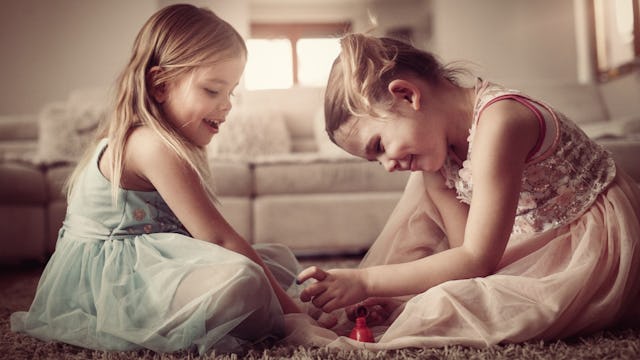This Simple 3-Minute Tool Stopped After-School Meltdowns For My Kids

“How’re you holding up?” parents whisper to each other on the sidelines at soccer practice. Our eyes are ringed with dark circles and we jump at every sound, surviving only on the shots of espresso floating in the jagged paper cups clutched to our chests. Our whispered questions are code for, are your children super unpredictable and scary right now too? Please say yes.
The beginning of a new school year always seems to be part adrenaline-fueled excitement mixed with epic meltdowns. Our children’s lives are new and thrilling, yet they have to maintain their cool all day long in front of friends and teachers. Parents become their safe zone. Home becomes the place where kids can finally let their walls down and, well, lose their ever-loving shit.
This year, I expected more of the same.
I’ve been meeting them at the bus, every day, mentally preparing myself.
“What was your favorite part of the day?” I ask cheerfully after they’ve bounded across the road. Here I am, deftly steering the conversation into a positive direction, asking open ended questions, doing good mom-like things. Inside I’m bracing myself, waiting for a hysterical outburst of tears that I just know is coming.
Over the last couple of weeks, we have gone through this process each day. And each day…has been totally fine. No drama. No tears. No flinging oneself upon the gravel road to moan about the woe the day bestowed upon them. Nothing.
And I began to think, huh, maybe this mindfulness shit is really working.
Two years ago, our school started a daily mindfulness practice called Reboot. The program is a series of pre-recorded guided mindfulness sessions that our children listen to each day after the morning announcements.
During the three minutes, Patti Schrader (the founder of Reboot) asks the kids to imagine that they are doing things like lying in the grass staring up at the sky, watching the clouds roll by, seeing shapes as they breathe. Or that they are taking their big feelings and tying them to a balloon. And as the balloon floats higher and higher, they feel lighter and lighter. They breathe, they visualize, they take a minute to connect with their body.
In three minutes, our children learn the skills to help them live in the present moment — that seemingly elusive place where we all want to live, that place that has been proven to change the structure of our brains.
Studies have shown that you can change the actual physical structure of your brain when you regularly practice mindfulness. Specifically, you can shrink your brain’s fight or flight center which is called the amygdala. And the prefrontal cortex, which is responsible for decision-making and focus, becomes thicker.
Our children are training their brains to be less stressed and make better decisions — so, of course, they are happier. This is, by far, the most successful school-year transition my kids have had and I don’t think it’s because of my amazing mothering skills. As parents, we can’t make our kids happier, but Reboot is giving them tools to find that happiness within themselves.
Reboot’s curriculum also helps fulfill some of the Social Emotional Curriculum that a lot of schools now require. And, due to popular demand, they’ve also added programs for home and specifically for home-schooling families.
This daily mindfulness practice has made all the difference in how my kids are feeling their feelings. They are learning to tie those big, scary feelings onto balloons and let them go into the sky instead of allowing them to fester into fat welts of despair that they then fling upon me at the bus stop. My kids are happier. I’m happier.
In this unpredictable world, we as parents are feeling this huge need to do something, anything, to make a difference in our kids’ experience at school. We can do this one thing. We can give them these three minutes where they can learn real life skills to make them better humans.
This article was originally published on